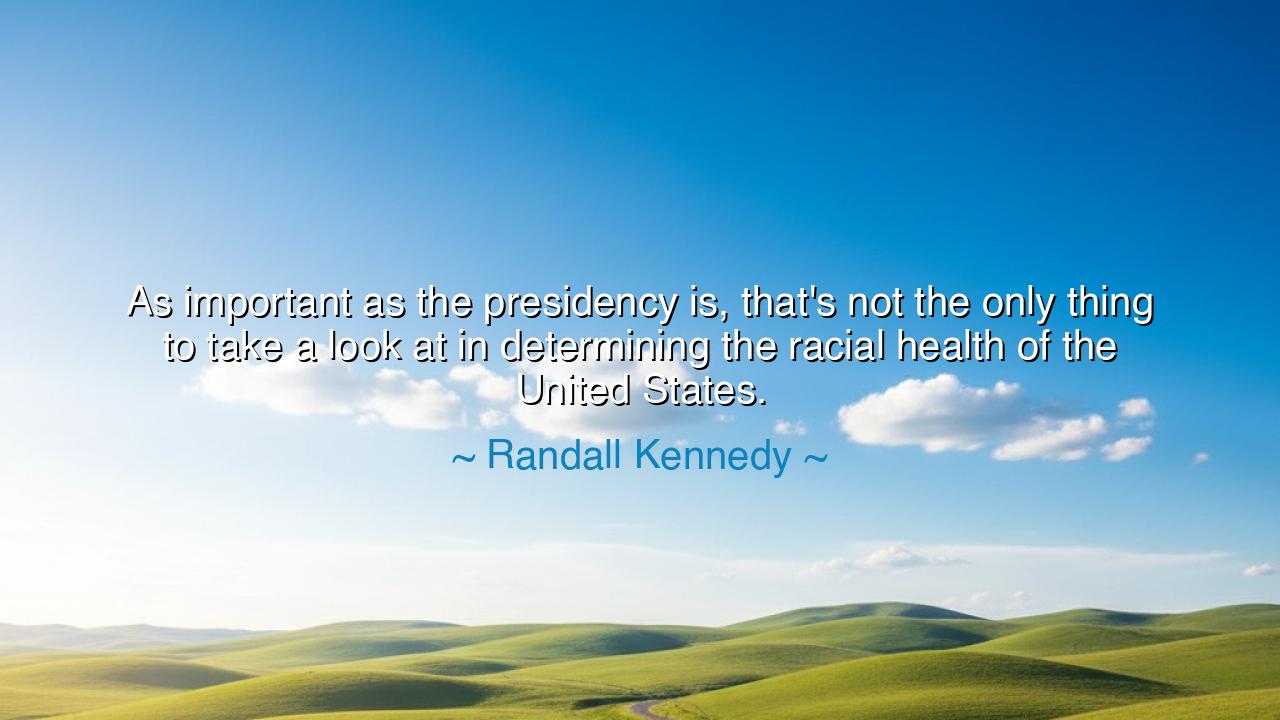
As important as the presidency is, that's not the only thing to
As important as the presidency is, that's not the only thing to take a look at in determining the racial health of the United States.






The words of Randall Kennedy—“As important as the presidency is, that's not the only thing to take a look at in determining the racial health of the United States.”—speak to a timeless understanding that true societal well-being cannot be measured solely by symbolic victories. Kennedy reminds us that while the election of leaders represents progress, the substance of racial justice, equity, and health lies in the daily experiences, opportunities, and systemic conditions that shape lives. Leadership matters, but it is the condition of the people—their rights, resources, and dignity—that reveals the true measure of a nation.
In these words, we perceive the ancient wisdom that symbols alone do not suffice to gauge justice. In the courts of Athens or the forums of Rome, the elevation of a citizen to high office was celebrated, yet philosophers and poets warned that the welfare of the populace—the poor, the disenfranchised, the marginalized—was the true measure of civic virtue. Kennedy’s reflection echoes this understanding: the presidency, however historic or powerful, is but one element in the tapestry of racial health. Equity, access, and opportunity must also be scrutinized.
The origin of this quote lies in Kennedy’s scholarship on law, race, and civil rights in the United States. While historic milestones, such as the election of an African-American president, represent symbolic victories, Kennedy emphasizes that racial health encompasses far more than leadership representation. It includes disparities in healthcare, education, housing, employment, and justice—everyday conditions that affect the lives of millions. His words challenge us to look beyond symbols to the structural realities that sustain inequality.
History provides striking parallels. Consider the Roman Empire, where the elevation of a new emperor might bring hope or celebration, yet the well-being of slaves, the poor, and the provinces often went unaddressed. True assessment of societal health required attention to infrastructure, nutrition, and justice, not merely ceremonial power. Kennedy’s insight is the modern echo of this lesson: to evaluate racial health, one must examine systemic realities rather than celebrate a single office-holder.
Kennedy’s reflection also carries a moral dimension: the danger of complacency in the face of symbolism. Societies may point to prominent figures as evidence of progress, yet ignore persistent inequities in everyday life. To honor the ideals of justice, one must attend to both representation and material conditions, ensuring that all members of society have the opportunity to thrive. This principle aligns with ancient teachings that true leadership is judged by the welfare of the many, not the exaltation of the few.
Consider the story of post-Reconstruction America, where African-Americans briefly gained political representation in southern states. Though symbolic victories were achieved, systemic discrimination, disenfranchisement, and economic marginalization persisted. Kennedy’s words remind us that symbolic progress, while meaningful, does not erase entrenched inequities. To measure racial health accurately, one must assess daily realities, access to resources, and protections under the law.
The lesson embedded in his words is timeless: do not be swayed by appearances or singular milestones. Measure progress by the lived experiences of the marginalized, the equitable distribution of resources, and the dismantling of systemic barriers. Representation matters, but it is only one facet of justice, not its entirety. True racial health requires vigilance, advocacy, and sustained attention to societal structures.
And so, my children, remember this eternal guidance: celebrate milestones, yes, but let your eyes see beyond them. Examine schools, neighborhoods, hospitals, and courts. Listen to voices often unheard, attend to conditions often ignored, and judge a society not by the figurehead it elevates, but by the equity, dignity, and opportunity it ensures for all its people. As Randall Kennedy teaches, the health of a nation is reflected not only in its leaders but in the lives of its citizens.






AAdministratorAdministrator
Welcome, honored guests. Please leave a comment, we will respond soon